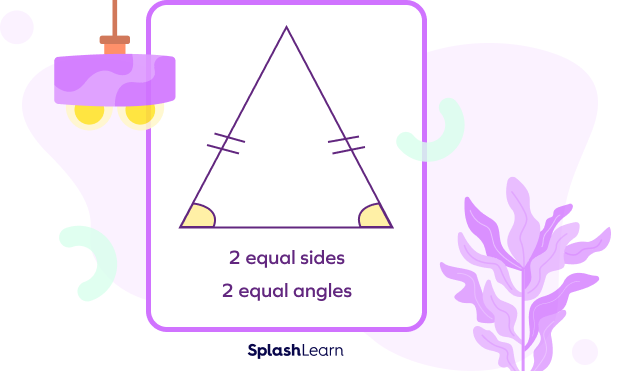- What Is the Perimeter of an Isosceles Triangle?
- Perimeter of an Isosceles Triangle Formula
- How to Find the Perimeter of an Isosceles Triangle
- Solved Examples on Perimeter of an Isosceles Triangle
- Practice Problems on Perimeter of an Isosceles Triangle
- Frequently Asked Questions on Perimeter of an Isosceles Triangle
What Is the Perimeter of an Isosceles Triangle?
The perimeter of an isosceles triangle is the sum of all its sides. It is given by $2x + y$, where x is the length of two equal sides and y is the length of the remaining side.
The perimeter is defined as the total length of the boundary of a shape. It is the sum of all the sides of the shape. A triangle is a polygon with three sides. So, what is the formula for perimeter of a triangle? It is simply the sum of all three sides of the triangle.
An isosceles triangle is a type of triangle that has two sides of the same length. Also, the angles opposite to the equal sides (known as the base angles) are congruent.
In the given $\Delta ABC$, AB and AC are two equal sides. Angles B and C are congruent.

Recommended Games
Perimeter of an Isosceles Triangle Formula

The formula for the perimeter of an isosceles triangle is given by
Perimeter $= 2x + y$
where, x is the length of the equal sides and y is the unequal side of the isosceles triangle.
Perimeter is measured in linear units such as inches, yards, etc., same as the length of the sides of the triangle.
Recommended Worksheets
Derivation of the Formula for Perimeter of an Isosceles Triangle
We know that the perimeter of a triangle is the sum of all its sides. Thus, if the side-lengths of a triangle are given by x, y, and z, then we can find the perimeter as
Perimeter of a triangle $= (x + y + z)$ units
Now, take a look at the isosceles triangle shown below where two sides are equal.
Thus, substitute $x = z$
Perimeter of an isosceles triangle $= x + y + x = (2x + y)$ units

How to Find the Perimeter of an Isosceles Triangle
Step 1: Note down the lengths of sides. Let the “x” be the length of equal sides, and “y” be the length of the unequal side. Make sure that all the sides have the same unit.
Step 2: Substitute the values in the formula.
Perimeter of an isosceles triangle $= (2x + y)$ units.
Step 3: Assign the appropriate unit, which will be the same as the length of the sides.
Perimeter of Isosceles Right Triangle
Isosceles right triangle, as the name itself suggests, is a triangle with one right angle and two equal sides.

In the given isosceles right triangle PQR, the sides PQ and QR are equal. These sides represent the legs (base and altitude) of the right triangle. The angle Q is a right angle.
Perimeter of an isosceles right triangle $= 2l + h$
If we don’t know the length of the hypotenuse, we can find it using Pythagoras’ theorem.
By Pythagoras’ theorem,
$Hypotenuse^{2} = Base^{2} + Perpendicular^{2}$
Thus, $h^{2} = l^{2} + l^{2}$
$h^{2} = 2l^{2}$
$h = \sqrt{2\;l}$
Calculating the Perimeter of an Isosceles Right Triangle if Hypotenuse Is Given
We have $h = \sqrt{2\; l}
Thus, $l = \frac{h}{\sqrt{2}}$
Perimeter $= h + 2 \frac{h}{\sqrt{2}} = h (1 + \frac{2}{\sqrt{2}})$
Perimeter of isosceles right triangle $= h (1 + \sqrt{2})$
Calculating the Perimeter of an Isosceles Right Triangle if Length Is Given
We have h = 2 l
We can rewrite the formula $(2l + h)$ as
Perimeter $= 2l + \sqrt{2\; l}$
Perimeter of an isosceles right triangle $= (2 + \sqrt{2})\;l$
Finding the Perimeter of an Isosceles Triangle with Base and Height
If we know the base and height, all we need to find here is the length of the equal sides.

In the isosceles triangle $\Delta ABC,\; AB = AC = a$
$BC = b$ is the base.
Consider the right triangle $\Delta ADC$.
$AD^{2} + CD^{2} = AC^{2}$ …Pythagoras theorem
$h^{2} + (\frac{b}{2})^{2} = a^{2}$
$a^{2} = h^{2} + \frac{b^{2}}{4} = \frac{4h^{2} + b^{2}}{4}$
Thus, $a = \sqrt{\frac{4h^{2} + b^{2}}{2}}$ …length of equal side
Perimeter $= 2 \times \sqrt{\frac{4h^{2} + b^{2}}{2}} + b = \sqrt{4h^{2} + b^{2} + b}$, where b is the base of the triangle and h represents altitude or height of the isosceles triangle.
Facts about Perimeter of an Isosceles Triangle
- Angles opposite to the equal sides in an isosceles triangle are congruent.
- Area of an isosceles triangle is given by $\frac{1}{2} \times Base \times Height$.
Conclusion
In this article, we learned about the perimeter of an isosceles triangle, its formula and steps for calculation. An isosceles triangle has two equal sides. The perimeter of the isosceles triangle is the sum of lengths of all sides. Let’s solve a few examples and practice problems.
Solved Examples on Perimeter of an Isosceles Triangle
1. What is the perimeter of an isosceles triangle if the base is 10 feet and equal sides are 5 feet long?
Solution: Perimeter of isosceles triangle $= (2 \times measure of equal side) + (measure of unequal side)$
Perimeter of isosceles triangle $= (2 \times 5) + 10$
Perimeter of isosceles triangle $= 10 + 10$
Perimeter of isosceles triangle $= 20$ feet
2. What is the perimeter of the right angle isosceles triangle if the hypotenuse is 3 feet.
Solution: The formula of the perimeter of the right angle isosceles triangle if hypotenuse is given
$= h (1 + \sqrt{2})$.
Perimeter $= 3 (1 + \sqrt{2})$
We know $\sqrt{2} \simeq 1.4$
Perimeter $= 3 (1 + 1.4)$
Perimeter $= 3 \times 2.4$
Perimeter $= 7.2$ feet
3. What is the measurement of two sides of an isosceles triangle if the perimeter is 60 feet and the base is 25 feet?
Solution: We will put the values in the formula to know the measurement of the sides of an isosceles triangle.
$60 = 2x + 25$
$2x = 60 \;-\; 25$
$2x = 35$
$x = \frac{35}{2}$
$x = 17.5$ feet
Thus, the two sides of the isosceles triangle are 17.5 feet each.
4. Calculate the perimeter of a triangle with two equal sides of 4 inches and a base of 3 inches.
Solution: It is an isosceles triangle. The perimeter is:
Perimeter $= (2 \times 4) + 3$
Perimeter $= 8 + 3$
Perimeter $= 11$ inches
Thus, the perimeter of an isosceles triangle is 11 inches.
Practice Problems on Perimeter of an Isosceles Triangle
Perimeter of Isosceles Triangle - Definition, Examples, Facts, FAQs
What is the formula for the perimeter of a triangle if p represents equal sides and z represents unequal sides?
Perimeter of the isosceles triangles the sum of two equal sides and one unequal side.
Perimeter $= 2p + z$
Perimeter of an isosceles triangle is 10 units. Find the unequal side if the two equal sides measure 3 units.
$10 = 3 + 3 +$ unequal side
Unequal side $= 10 \;-\; 6 = 4$ units
What is the hypotenuse of the right isosceles triangle with legs “l”?
Hypotenuse of right isosceles triangle $= \sqrt{2} l$
What is the perimeter of the given isosceles triangle?
Perimeter $= 15 + 15 + 17 = 47$ units
Frequently Asked Questions on Perimeter of an Isosceles Triangle
What is the sum of the angles of an isosceles triangle?
Regardless of the type of triangle, the sum of the angles of an isosceles triangle is always 180 degrees. Thus, the sum of the angles will be 180 degrees with two equal and one unequal angle.
Will it be an isosceles triangle if all the angles of a triangle are equal?
A triangle with all equal angles and equal sides is called an equilateral triangle. The isosceles triangle has only two equal sides and two equal angles.
What is the area of the isosceles triangle?
The area of an isosceles triangle is $\frac{(base\; \times \;altitude)}{2}$. The altitude joins the midpoint of the base with the topmost angle of the isosceles triangle.
What is the formula for the perimeter of an equilateral triangle?
Perimeter of an equilateral triangle $= 3 \times side$.




























